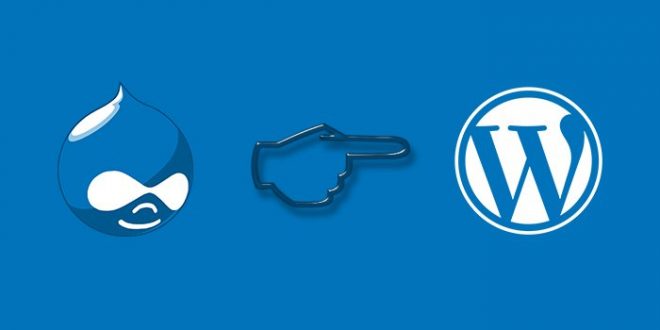Our Blog
GETTING STARTED WITH THE DRUPAL TO WORDPRESS MIGRATION

Of all the content management systems, WordPress is the most popular among the website owners. It is an open-source website creation platform that is quite simple and hassle-free. Most website owners are now getting their Drupal, Joomla, or HTML sites converted to WordPress. Though these platforms are quite good as content management systems that help you build fully functional websites, the huge popularity of WordPress is forcing people to switch to it. The primary reason for this trend is that WordPress is very simple to use and offers a host of features including a variety of themes and plugins which help you enhance your website.
This article discusses the fundamentals of how to convert Drupal to WordPress. The process is quite simple and easy to implement. You can either do it yourself or hire a professional to do the job. But, before we go into the details of the conversion, let us first understand why it is important for Convert Drupal to WordPress.
Why Drupal to WordPress?
No doubt, Drupal is a great content management system, but it is not meant for non-technical users and bloggers. It is quite difficult for non-technical users to understand the intricacies of this system. It takes some time to understand the functionality and get used to it. Every other person, with a basic knowledge of computers, can build a website on WordPress by simply following the instruction, which is not the case with Drupal. You have to have the specific technological knowledge for that, as also for maintaining and managing it. With WordPress, there is no such hassle.
Another question that props up is why only WordPress, why not some other platform? It is because WordPress sites are very easy to build and manage, and provides enough flexibility by offering multiple themes and plugins. It’s a versatile, unparalleled platform.
Some Similarities
Technically speaking, both are quite similar. They have many similar features, but with different names. The content elements in Drupal are known as Nodes, whereas in WordPress it’s called Posts. What are known as Blocks in Drupal, are called Widgets in WordPress. Menu in both the CMS is known by the same name and has exactly the same functions. Modules in Drupal and Plugins in WordPress allow you to enhance the functionality of the website.
As both the content management systems have lot of similarities and some common features, it is not that difficult to convert Drupal to WordPress.
Migration
As you get ready to migrate from Drupal to WordPress, keep these key points in your mind.
Content
Moving content from Drupal to WordPress is easy and there are many ways in which you can do that. The other way round, however, is a bit complex and you will need to put in quite a bit of effort. Various articles available on the net explaining how to do the conversion, are all based on database editing which is not suited to non-technical persons. An easy way out is to use RSS feed. You have to create an RSS file via the feed view and then connect it to a post through the multi importer.
Images
Moving images is not difficult, but a painstaking task. Make a folder by copying all the images and then paste it on the WordPress website. The images are then integrated into the website with the help of Add from Server plugin. But there is a glitch; the images now have different links which don’t allow them to load. To rectify this error, you will have to go to PHPMyAdmin and manually correct the paths.
SEO
Search engine optimization is the most critical aspect of any website. It is responsible for the ranking your website gets in search engine results. Migrating from one platform to another may disturb your ranking which can adversely affect your business. To maintain your ranking even after conversion, you have to ensure that both, the old and the new URLs match. It’s not tough though, you can easily do it through .htaccess file.
Comments
Moving comments from the old website to the new one is important, especially, if you are running a blog or providing some service where viewers’ comments and feedback play an important role in the success and growth of your business. You just can’t dump them. Of the many ways in which comments can be migrated to the new site, installing the Disqus plugin is by far the best way. This is a networked community platform with feature-rich comment system used by hundreds of websites. It lets you sync your website comments with Disqus API.
URL Mapping
One major issue that arises when you convert Drupal to WordPress is that all small function words or stop words, such as the, is, on, of, etc. are filtered out by Drupal as they can create problems during a search. Word Press doesn’t do so but uses them as it is. To make sure that users are able to access the new blog through the old URL, you have to build a 301 redirects set.
If you want to convert your site to WordPress, make sure that you know what exactly you want to do and how you would do it. Otherwise, hire a professional who has the expertise in converting a Drupal website into the WordPress site.